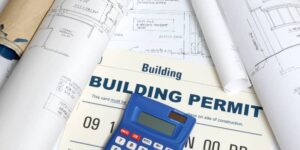A commercial building permit is required before any construction or remodelling can begin on commercial buildings or structures, such as shopping malls, restaurants, schools, hospitals, and so on. A commercial building permit ensures that the work done on the building meets all the codes and requirements set by the local government and does not endanger the lives of workers or people who will be using the building in its new state. However, you may be wondering what exactly is a commercial building permit and why do you need one? Keep reading to find out more about this essential document!
Before You Need To Get A Commercial Building Permit
Before you begin work on a commercial building or structure, you will need to obtain a commercial building permit. This is required by law, no matter how big or small your project may be. Although obtaining a permit may sound like an easy task, several things must be considered before you apply for one. If you do not follow these requirements precisely, then your permit application could be denied or delayed indefinitely.
Types of Commercial Buildings
There are two types of commercial buildings. The first type, referred to as a non-residential building, is used for purposes other than residential living. Non-residential buildings include offices, retail spaces, hotels, industrial parks, and storage facilities to name a few. Residential buildings are designed for residential use such as houses or apartments. Like non-residential buildings, residential buildings may require a commercial building permit depending on their size or location. Before beginning construction on either type of building, it’s important to consider whether you need to apply for a commercial building permit or contact your local municipality’s permitting department directly regarding requirements specific to your project.
Work Permits Required
It can be tempting to go ahead with construction on your commercial building or structure without a permit. It might be easy enough to find a willing builder, but having one on board before starting your project isn’t necessarily vital. The problem? A lack of a permit can lead to steep fines if you’re caught (and you will be). In addition, you’ll need permits for all types of work that are detailed in local, state, and federal codebooks. While reading these books sounds boring (and perhaps overwhelming), construction crews must know exactly what they’re doing before getting started on any building or structural improvements. To summarize: get your commercial building permit first; then hire a builder who has one too! Your wallet will thank you later.
How to Get a Commercial Building Permit
The first step in getting a commercial building permit is to choose your project. Getting a permit for work on a new building or structure means submitting plans that include construction details such as dimensions, materials, electrical hook-ups, fire protection equipment, and more. To avoid delays during construction, make sure you know what’s required from day one. If your project involves alterations or additions to an existing structure (as opposed to new construction), you may be required to submit plans for review by city officials even if it does not require a building permit; if you are doing demolition or other significant site alteration procedures, you will likely need some sort of clearance from city officials before proceeding with any work.
Receive your Commercial Construction Certificate
Once you have a completed plan approved by your local municipality (check with them as every community varies in permit requirements), you can move on to receiving your construction permit. There are two stages of building a commercial structure: pre-construction, which consists of all work before pouring concrete; and construction, which starts with concrete being poured. The pre-phase will require you to submit plans to your city or county, pay inspection fees, apply for temporary permits (if necessary) and wait for approval from that agency before beginning construction. Your timeline may vary depending on your project but will likely take three weeks or more. So how do we get there? Here’s how one piece of our framework moves through each stage until completion.
Use your Commercial Construction Certificate Responsibly
A commercial construction certificate is a certification that you have fulfilled certain requirements regarding training, licensing, and education. It can be a valuable asset to your career; however, with great power comes great responsibility. Without responsible use of your Commercial Construction Certificate, you may lose your license or even face legal action.
Here are a few suggestions on how to use your Commercial Construction Certificate Responsibly Two years after obtaining my commercial construction certificate I was told by my employer that they were not going to renew my contract because I refused to follow through with an order to work outside in freezing temperatures during a snowstorm. As I had worked in freezing temperatures before, I refused because of safety concerns. The company informed me that if I didn’t do as they said, they would make sure I never worked again. When I refused again, they informed me that if I did not get out immediately, they would call security and have me escorted out of their office building.








